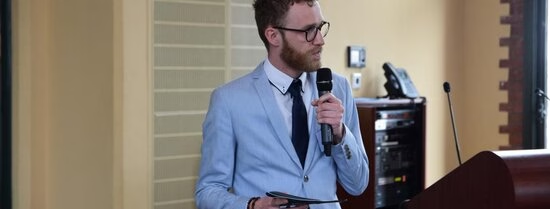Teachers come in all shapes and sizes, ages and experience levels, and Risbo loves working with all of them! A special group consists of student assistants who perform teaching-related tasks. Second- or third-year undergraduate or graduate students who engage in this kind of educational side job can follow specific didactic modules at Risbo that help them perform their classroom tasks. William Pitz, educational consultant and trainer at Risbo, is often involved with these trainings.
William, a student in front of the class, does that happen a lot?
Indeed it does. Students are frequently employed in higher education, and there is nothing wrong with that, provided they are adequately selected and supervised. It really adds value for both the student-as-teacher (SAT for short), for the students, and for the university. It is, for example, an incredibly good way to gain didactic and pedagogical skills. For students, it can be threshold-reducing to be taught by someone closer in age and life experience. And for the university, the use of a SAT can alleviate the burden on staff, but as far as I am concerned that should never be the intention.
What constitutes the SAT-training at Risbo?
Basically, this training covers the same fundamental aspects as the UTQ and all other Risbo courses: design, teaching, assessment and evaluation. And even though a SAT is hardly ever involved in designing education, it's still important to learn how and why a curriculum is structured the way it is. A well-developed course has no superfluous components, and it's important to understand this when you start teaching.
"A well-developed course has no superfluous components, and it's important to understand this when you start teaching."
Were you a student assistant yourself?
Yes, I was! I taught the course communication and group skills to first-year psychology students for about 1.5-2 years, while I was in Groningen, obtaining my bachelor's degree in psychology.
Did you enjoy it?
Laughing: it was pretty cool actually. I thought it was exciting, but in a healthy way. I was still quite young of course, but I was confident enough to stand in front of the group and rely on the knowledge I had. Besides, I received good coaching along the way.
How did they arrange this coaching?
It was very convenient that I had a teaching skills class at the beginning of the week and could apply those insights and information in front of the class during the rest of the week. In addition, the Master students had a coaching role towards second- and third-year bachelor students, who in turn taught first-year students. So, you learn a lot from each other and on the job.
How do you use your SAT experience in your work?
It really helps that I can relate to the classic, psychological things that every SAT runs into: nerves, fear of losing authority, fear of making mistakes or fear of not knowing everything. During the training, we provide the SATs with tips and tools and really focus on reducing that anxiety. We need them to get through the first and second lesson with a good feeling, because those ‘first times’ are crucial for how someone will perform during the rest of the course.
"It's important to coach a SAT through the first and second lesson with a good feeling, because those ‘first times’ are crucial for how someone will perform during the rest of the course."
Is this possible in a one-day training?
Sure, but you have limited time. We provide so-called “mini-instructions” per individual participant. This is because everyone has their own past and mental load, based on previous learning experiences, their particular anxiety pattern or view on what teaching should look like.
You are also EUR's representative in StuKO, what's that?
The StuKO, the national Student Qualifications Education project, was created to gain a better understanding of the qualities and skills that are important when using SATs. The central question is how universities can better recognize, guide, and value their SATs. Eventually, this may result in a guideline or perhaps even a certification that benefits SATs in the remainder of their careers, also outside higher education.
STUKO is developing an e-learning module for SATs?
Yes, that is great fun, but also quite a challenge as we started from scratch. In the end we want to deliver a really good, fun, and useful module which is directly applicable for all. So, we've set the bar high.
So, no more SAT-training once the module is finished?
The opposite! No, we really want to make a supportive product, a kind of interactive workbook, that is used in combination with guidance prior to and during deployment in education. So, it is explicitly not a stand-alone e-learning.
Will Risbo use this in the future?
The strength of our didactic modules is that we make a strong combination of digital preparation, which is further supplemented and deepened during an in-person training or workshop. This e-learning would fit nicely into that approach, but we are not there yet. In any case, Risbo likes to talk to faculties to see what we can do for them in this area. We are already working closely with the tutor academy of Erasmus School of Economics (ESE) and we would love to do the same for other EUR Schools.
- More information
Are you interested to know more about StuKO? Visit the website to read more about this initiative: StuKO | Universiteit Utrecht (stuko-project.nl)
Would you like to get in touch about a SAT-training? Send an email to William to discuss what Risbo can do for you.

